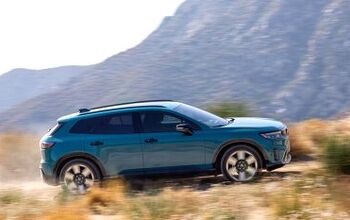Pundits Push Gas Tax Hike From Left and Right

Last week, I bought gasoline for less than $2/gallon for the first time in probably more than a decade. A tankful for my ’08 Civic (stick) cost me sixteen whole dollars and fifty-three cents.
Now two leading thinkers, one from each party, have called for taking the opportunity of low gas prices to slap a tax on petroleum—or on carbon.
The impetus for such a tax is what economists dryly call “internalizing externalities.” Our appetite for petroleum causes harm through global warming, chronic health conditions, and large payments to countries that do not have our best interests at heart. All this harm is a bundle of externalities that goes unaccounted for in the price of fuel.
Last Friday, Charles Krauthammer, a conservative Washington Post columnist, wrote that he’s been pushing for a “major tax on petroleum” for the last 32 years, and he advocated raising the price of gasoline by a dollar. The revenue, $12 per week per average American, Krauthammer calculated, “should be used to reduce the Social Security tax.”
Krauthammer said his gas tax would do far more to boost gas mileage than CAFE, which he asserted forces carmakers “to manufacture acres of unsellable cars in order to meet an arbitrary, bureaucratic “fleet” gas consumption average.” (No argument there!).
The previous Monday, Larry Summers, who was Secretary of the Treasury under President Clinton, and who is former director of President Obama’s White House National Economic Council, called for applying a $25/ton carbon tax—a level he refers to as “a good place to start.” That would raise gasoline prices by 25 cents. But it would also boost the cost of all carbon fuels, letting the market decide where best to cut back. Summers proposed dividing the revenues between infrastructure and “pro-work tax credits.”
Summers advocated levying that tax not just on American goods and services, but on imports from countries that lack carbon taxes. He sees the carbon tax as important both practically and symbolically, to encourage the rest of the world to address climate change.
“I thought both op-eds were terrific,” says Alex Bozmoski, director of strategy and operations at the Energy and Enterprise Initiative (E&EI), at George Mason University. E&EI was founded several years ago by Bob Inglis, a former Republican congressman from South Carolina, to promote conservative strategies for mitigating global warming.
Bozmoski first appreciated the issue’s importance when he took a climate science class in order to heckle the professor, but came to realize that the scientific uncertainties he harped on were the essence of risk—of which there was plenty to go around. Examining the two proposals, he prefers a carbon tax to a gas tax for its greater efficiency at reducing greenhouse emissions, and its encouragement of innovation in a broader field of technologies. He notes that a carbon tax would be expected to rise over time, and that businesses buying power plants would take future costs into consideration.
But Bozmoski also calls Krauthammer’s proposal “outstanding,” and “a clear, major improvement over the status quo.” Krauthammer, he says, is “a thought leader of the conservative movement. He’s asking the question, ‘doesn’t it make more sense to tax things that we want to use less of [gasoline] rather than things we want more of [jobs]?’.”
In his quest, Krauthammer compared himself to Don Quixote. There’s hope that he’s wrong. Currently, key Republican law makers are open to raising the gas tax (and Democrats are clamoring for action). Money raised by a petroleum tax is money that would stay in the United States instead of boosting Vlad Putin’s political fortunes and enriching Middle Eastern countries that abet terrorists. And by encouraging Americans to purchase more fuel efficient vehicles, and insulate their houses—long-term investments in efficiency—a petroleum tax would be a gift that keeps on giving.
David C. Holzman writes from Lexington, Massachusetts. His website is motorlegends.com. There, you can see photos of the Yugo Next exhibit, learn about Richard Nixon’s biggest mistake (which had to do with LBJ’s ’53 Buick, “Hannibal,”) and purchase a ’58 Edsel or ’57 Chevy shirt.

I'm a freelance journalist covering science, medicine, and automobiles.
More by David C. Holzman
Latest Car Reviews
Read moreLatest Product Reviews
Read moreRecent Comments
- ToolGuy The other day I attempted to check the engine oil in one of my old embarrassing vehicles and I guess the red shop towel I used wasn't genuine Snap-on (lots of counterfeits floating around) plus my driveway isn't completely level and long story short, the engine seized 3 minutes later.No more used cars for me, and nothing but dealer service from here on in (the journalists were right).
- Doughboy Wow, Merc knocks it out of the park with their naming convention… again. /s
- Doughboy I’ve seen car bras before, but never car beards. ZZ Top would be proud.
- Bkojote Allright, actual person who knows trucks here, the article gets it a bit wrong.First off, the Maverick is not at all comparable to a Tacoma just because they're both Hybrids. Or lemme be blunt, the butch-est non-hybrid Maverick Tremor is suitable for 2/10 difficulty trails, a Trailhunter is for about 5/10 or maybe 6/10, just about the upper end of any stock vehicle you're buying from the factory. Aside from a Sasquatch Bronco or Rubicon Jeep Wrangler you're looking at something you're towing back if you want more capability (or perhaps something you /wish/ you were towing back.)Now, where the real world difference should play out is on the trail, where a lot of low speed crawling usually saps efficiency, especially when loaded to the gills. Real world MPG from a 4Runner is about 12-13mpg, So if this loaded-with-overlander-catalog Trailhunter is still pulling in the 20's - or even 18-19, that's a massive improvement.
- Lou_BC "That’s expensive for a midsize pickup" All of the "offroad" midsize trucks fall in that 65k USD range. The ZR2 is probably the cheapest ( without Bison option).


































Comments
Join the conversation
RE: "Speculators control 70%-80% of oil futures contracts. When a small group controls that much of the market, they effectively set the price." Sure, if you can show that all of these speculators entered into some kind of plot at the same time, which you can't. OPEC has the strongest influence on global oil prices via its spigot. There has to be a reason they don't produce any more oil now than they did in 1973. It ain't that hard to figure out. RE: "As I said, if you want the oil markets to truly reflect the economic fundamentals of supply and demand, become a noisy pain to your Congressional representatives and demand the repeal of the Commodity Futures Modernization Act of 2000 and The Financial Services Modernization Act of 1999. Otherwise, don't be surprised when the price of gas is much higher again in the not too distant future." The CFMA has nothing to do with OPEC's stranglehold on global oil prices. But it needs to be repealed anyway for other reasons. For the most part, OPEC keeping oil at a relatively high rate is a good thing long term. Every now and then OPEC will allow a glut to lean out high cost producers and other competitors. That's what monopolies and cartels do. This isn't the first time. Neophytes think this is a new thing. It will last about 24 months, plus or minus a few months. Were the Keystone Pipeline already built there wouldn't be any traffic to pay for it as the Canadian shale and sands oil loses money at today's oil prices. Who pays the debt service on the pipeline at $50/bbl? Better yet, who pays the maintenance?
Yes, SOME speculators engage in a strategy called "contango." You have to be really big to move the needle with a strategy like that, but there are times when a bunch of big players act at the same time. They can make a lot of money for a spell if they succeed. But don't think this is widespread or a primary driver of global oil prices.